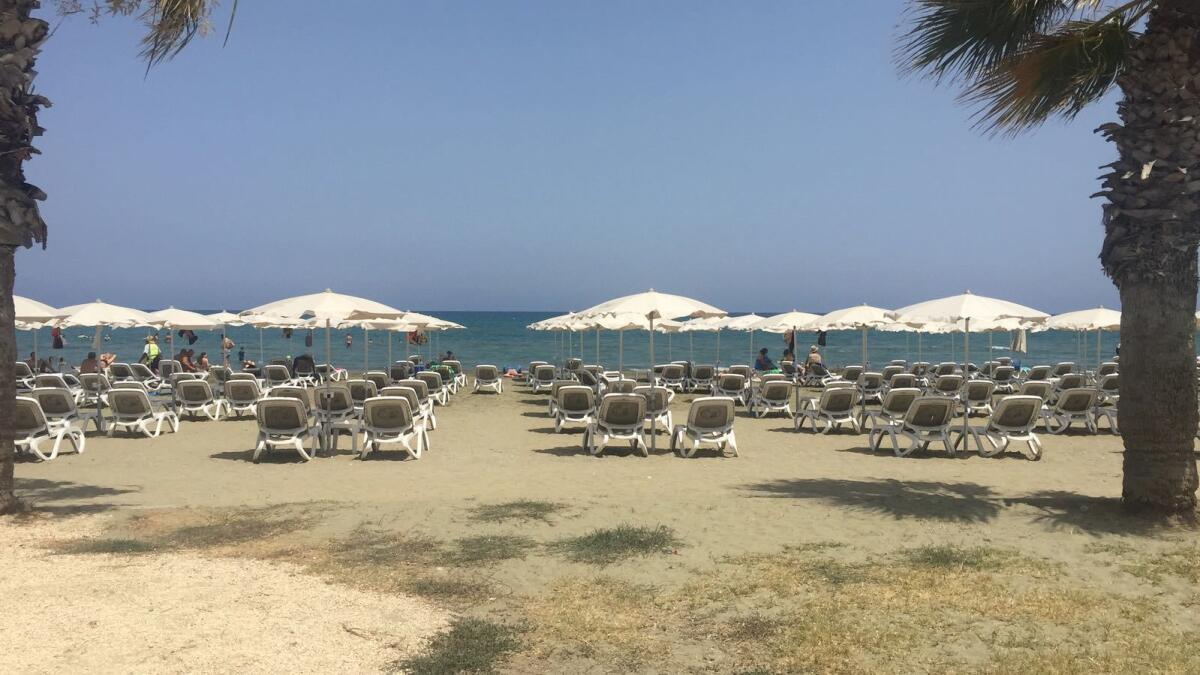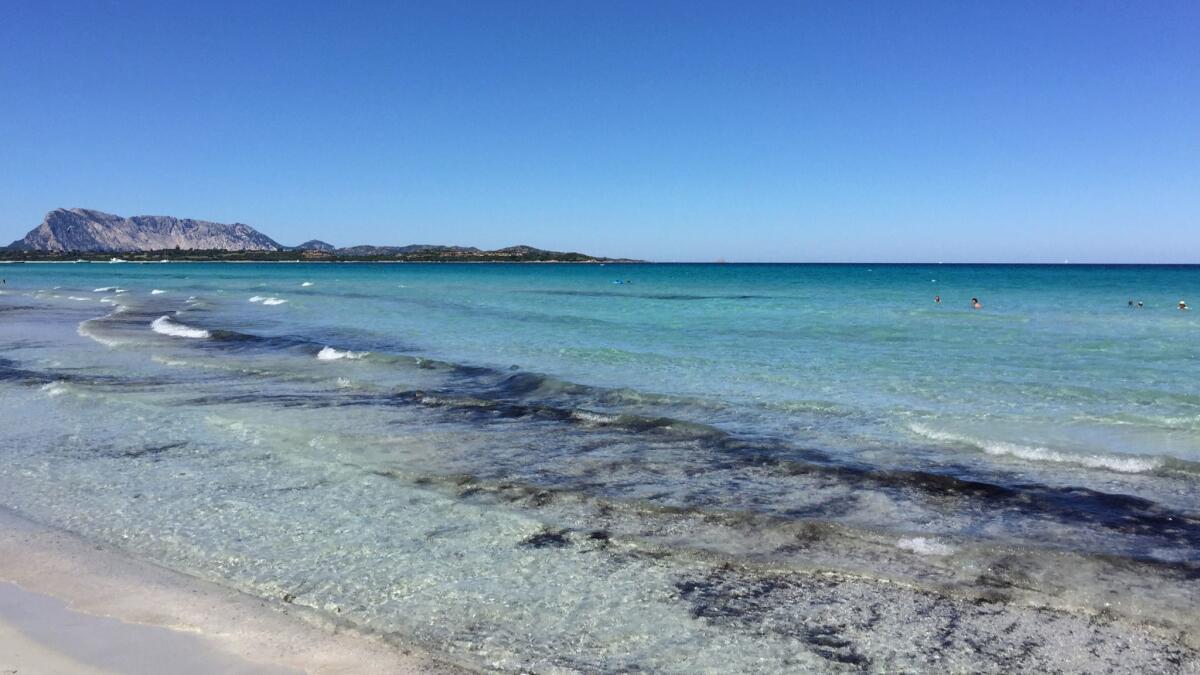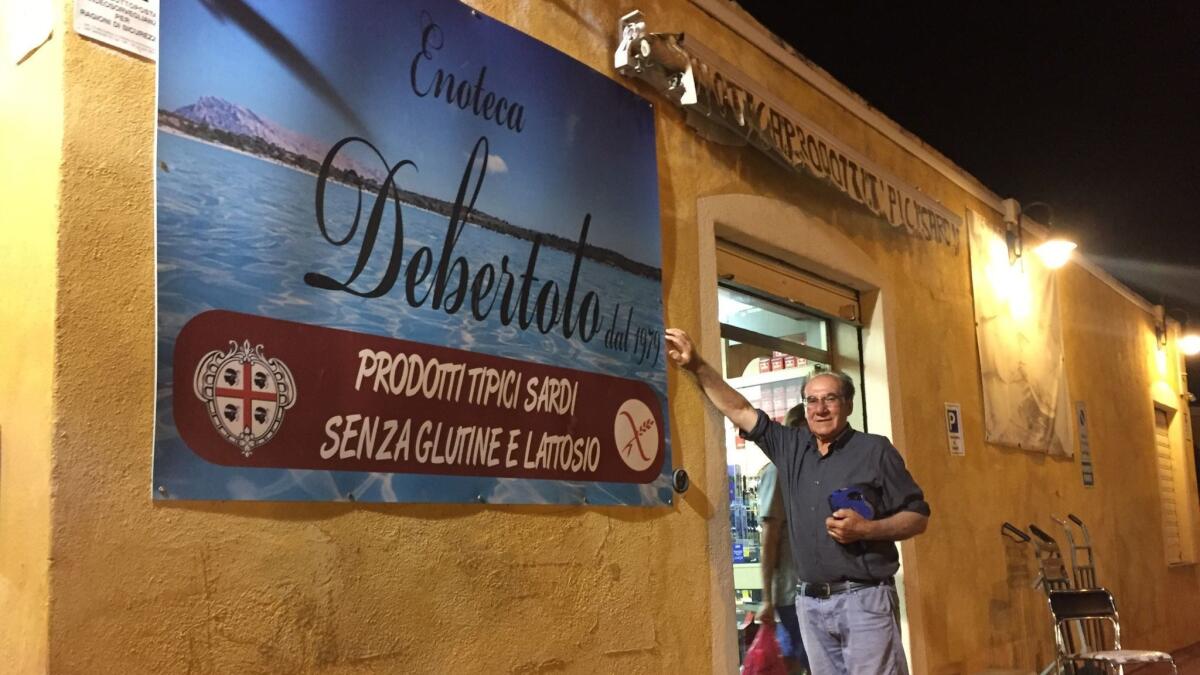A town at the front lines of the migrant crisis: ‘We can’t let them die’

- Share via
Reporting from San Teodoro, Italy — The town of San Teodoro does not look like the front line of any battle, much less one that is threatening to tear Europe apart.
What it looks like is a holiday maker’s dream of an Italian resort. Rising out of the Mediterranean on the island of Sardinia, it is breezy and hilly and lined with shops selling sharp, knee-length yachting shorts, sparkly flat sandals and crocheted bikinis.
Distracted visitors can find themselves paying $115 for what Americans might consider a scrawny lobster, but the shock of the bill is mitigated by a tiny, icy shot glass of mirto, the local liqueur, which, like Sardinians, is reputed to be both prickly and alluring.
According to regional tourism authorities, the province of Gallura, spanning popular San Teodoro and the flashier enclaves of the Costa Smeralda, 35 miles to the north, where George and Amal Clooney vacationed earlier this month, is the most visited part of Sardinia, which gets about 3 million tourists a year.
In winter, only 5,000 people live in San Teodoro, but in the summertime, it is thronged by vacationers enjoying the village’s easygoing luxury, the famously wide, white beaches, or, for the more adventuresome, some of the longest hiking trails in Europe, which wind up and around Sardinia’s unforgiving craggy hills.

La Cinta, a local beach that takes the form of an elongated C, is heaven for kite-surfers. It is in many ways the heart of San Teodoro, and it is here where a new sort of foreign guest stands out.
Standing amid the chaise longues and parasols and trendy sun-screening mini-tents, dark-skinned men are at work selling everything from ultra-light microfiber towels to billowing eyelet summer dresses.
As evening falls, shuttles from the various San Teodoro hotels arrive at the beaches to pick up their guests, often chatting in French or German. A few feet away, clusters of men from Somalia, Senegal, Yemen or Bangladesh shuffle around in silence, waiting for transportation to bunks in crowded dormitories.
Their legal status is unclear, and locals are uncertain what to make of them.
In Italy’s recent elections, Sardinia voted for the Five Star Movement, a populist, anti-immigrant party established almost 10 years ago by a comedian and a Web strategist. It is a member of the coalition government that took over in June.
“We voted for them,” says Antonio Debertolo, a 71-year-old who raised himself out of poverty and now owns a thriving business as well as an apartment building. “We were tired of what we had before. It was a protest vote. They hadn’t resolved any of problems in Europe — in general, not just with immigrants.”
Italy was once considered relatively welcoming to refugees and immigrants. But it has been at loggerheads with much of Europe since its anti-migrant interior minister, Matteo Salvini, barred rescue ships from docking at Italian ports and accused them of operating as “taxi services” for refugees. Last month, Salvini blocked the Aquarius, a vessel carrying 629 migrants, from docking in Italy, leading to outrage from fellow European leaders and a standoff at sea.
The United Nations refugee agency in Libya reported that more than 200 migrants drowned in the Mediterranean in the first three days of July, bringing the death toll for 2018 to more than 1,000.

The number of arrivals in Italy has gone down by as much as 80% compared with 2017, but international refugee agencies believe that Italy’s hard-line policies may also be prompting human traffickers to take greater risks, with a resulting rise in fatalities.
Debertolo says the problems of the refugees must be resolved in their home countries, not principally in Italy.
“We can help them here, but the politicians need to help them first there, in Libya, in Syria, where there are wars,” he says. “We can’t let them die, but they have to be integrated here, and integration here is difficult.”
Having once been an economic migrant himself, Debertolo has a singular perspective. In 1966, when he was 19 years old and “life in Sardinia was very hard,” Debertolo left San Teodoro, his parents and 11 siblings, and headed to Switzerland, where for 10 years he worked in anything from coal to cattle -- and saved.
He is uneasy with the migrant crisis, but he does not consider the men selling things on San Teodoro’s beaches, or pushing trolleys with crates of local wines into bar kitchens at night, a particular burden. “They work,” he said.
Sardinia has long been proud of its reputation for toughness. According to local lore, the harsh rocks of Sardinia’s interior were so forbidding that the Romans took one look and turned away. Its reputation for glamour is barely 50 years old.
When the sun goes down, San Teodoro fills with the scent of the hardy herbs that thrive on the rocky elevations: helichrysum, which emits a sweet, musky aroma popular in the American fragrance industry, fennel, thyme and myrtle.
Myrtle is especially celebrated, and it is impossible to end any meal here without being offered a shot of purplish black mirto. It is invigorating and rugged, sweet with a slight astringent kick at the end.
Berries are harvested from wild bushes in winter, but the drink’s mysterious earthiness comes from the bitter leaves and twiggy stems of the myrtle bush. They steep for at least a month alongside the fruit in Filu ‘e Ferru, a sharp local grape distillate.
Mirto is locally considered something of a cure-all, an anti-inflammatory and antiseptic tonic.
At nearly midnight, Debertolo, working the cash register at his Enoteca Debertolo, an emporium of Sardinian products, counsels a wary tourist to select a bigger bottle.
She wavers.
“You pay more for the small bottle and you’ll be back here tomorrow for more,” he says with practiced resignation.
He’s right; the next night she returns and buys a large bottle. Debertolo said he sells more than $200,000 worth of mirto per season.
“Sardinia is an island,” Debertolo says, over sheep cheeses and bottles of local red wines. “Sardinians are not open people. But they have heart. You can count on a Sardinian.”
Tarnopolsky is a special correspondent.
More to Read
Sign up for Essential California
The most important California stories and recommendations in your inbox every morning.
You may occasionally receive promotional content from the Los Angeles Times.










